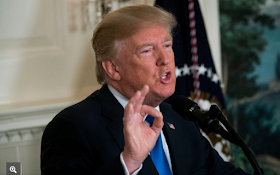Negotiators
warn never to take a hostage you can’t shoot. By announcing Friday that the
administration would not certify that the 2015 nuclear deal with Iran was in
the national interest, Donald Trump has taken a hostage.
The hostage is the deal itself. Contrary to
belief, decertification neither violates nor cancels the agreement. It does not
betray our commitments to our allies and it does not abrogate our obligations
to the Iranians. It’s an act of domestic politics between two branches of the
United States government.
But
it’s also a psychological step, a brash signal that Trump is prepared to see
the deal fail and accept the consequences, including war, if he can’t negotiate
a better one. Since Iran insists it won’t budge, it sets Washington and Tehran
on a path of confrontation that can be averted only if one side or the other
blinks. Decertification is Trump saying: We won’t blink.
On Thursday, a well-placed source who advises
the administration on Iran policy and supports decertification listed for me
all the ways things could go wrong.
There’s personnel
risk, starting with the volatility of the man at the top.
There’s escalatory risk, as the United
States, its forces thinly stretched in the Middle East, become vulnerable to
attack by Iran’s terrorist proxies. Think of the Marine barracks bombing in
Beirut in 1983 and the humiliating American withdrawal in its wake.
There’s
diplomatic risk, as Iran traps Western diplomats in a process of never-ending
negotiations designed to go nowhere — all the while turning the Islamic
Republic into a reputable member of the international community and the United
States into the global pariah.
Above all, there’s the risk that Iran will
call Trump’s bluff, much as Bashar al-Assad called President Obama’s when he
failed to enforce his chemical red line in 2013. A superpower repeatedly
exposed as a paper tiger by lesser, if more willful, adversaries will not
maintain its pre-eminence for long.
So
what’s the case for supporting decertification?
The architects of the nuclear deal make three
dubious claims on its behalf. They say it concerns Iran’s nuclear dossier
alone, and does not prevent us from thwarting Tehran’s regional bids in Syria,
Iraq, Lebanon, Yemen, Gaza or the Gulf. They claim the deal is working because
Iran is abiding by its terms, as certified by the International Atomic Energy
Agency.
And they add that since the agreement
permanently enjoins the Iranians from acquiring nuclear weapons, the United
States maintains the military option to stop them from doing so.
Yet Iran’s regional behavior has become worse
since the nuclear deal came into effect, not least because it provided the
regime with a huge new income stream — $10 billion in cash and gold in 2016 alone, plus more than $100 billion in additional sanctions relief — to fund its work.
Tehran also operates on the assumption, well justified during the Obama years, that
the United States would not risk the nuclear deal for the sake of rolling back
Iranian gains in Syria and elsewhere.
As for the point that the Iranians are
generally (if not quite entirely) honoring their end of the
bargain — why shouldn’t they? “Iran doesn’t want a bomb today,” one senior
Israeli official told me. “It wants a bomb tomorrow.” That is, it wants a
robust nuclear base that puts it within a screw’s twist of a sizable nuclear
arsenal without the economic and security risks of actual possession.
And if it does choose to go for a bomb once
the agreement has run its course, our military options will be slight. If we
couldn’t prevent Pakistan or North Korea from going nuclear in the 1990s, why
should we think we’ll be able to stop Iran in the nick of time?
My critics will claim
that a distant prospect of a nuclear Iran is still vastly preferable to an exit
from the deal that allows Iran to bring its centrifuges out of storage and
start spinning its way to a bomb once again, this time without the monitoring
of United Nations inspectors.
Maybe. But Iran still wants the economic
benefits of the deal — benefits Washington alone can bestow through waivers,
permits, relief from secondary sanctions and control over dollar transactions.
The American Goliath needn’t be helpless against a Middle Eastern state with a
gross domestic product only slightly larger than that of metropolitan Atlanta.
We
are living through a nuclear nightmare on the Korean Peninsula after more than
two decades of optimistic diplomacy. That’s a fate we ought to do everything
possible to avoid with Iran. As Mark Dubowitz of the Foundation for Defense of
Democracies points out, “decertification isn’t a sufficient condition to break
the paralysis of our Iran policy, but it is a necessary one.”
Even if the rest of
the difficult enterprise rests in the hands of — God help us — President Trump.
